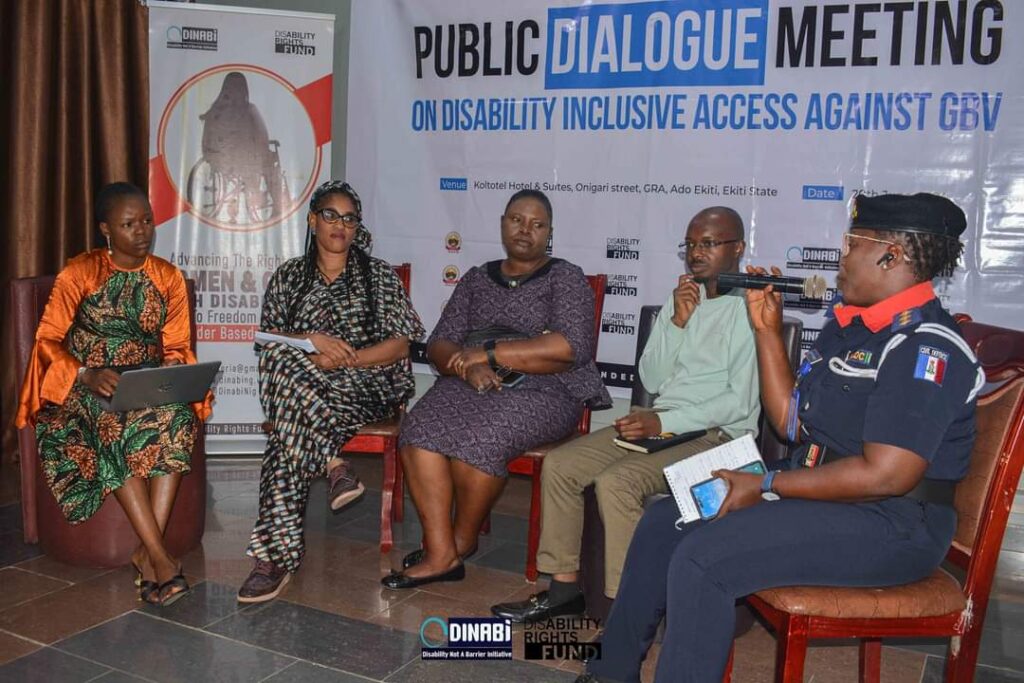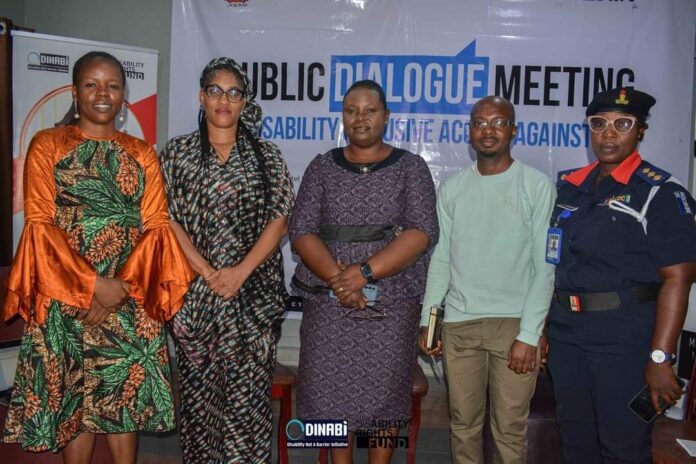Ado-Ekiti, Nigeria — June 20, 2024: In a significant move towards championing the rights of women and girls with disabilities, Ekiti State recently hosted a pivotal one-day public dialogue on Disability Inclusive Access to Justice Against Gender-Based Violence (GBV). Held at Koltotel Hotel & Suites in Ado-Ekiti, the event brought together an array of key stakeholders to address the critical intersection of disability and gender-based violence.
The event, funded by the Disability Rights Fund (DRF) and organized by Disability Not A Barrier Initiative (DINABI), in collaboration with the Office of the Special Adviser to the Governor on Special Education and Social Inclusion, was aimed at promoting equitable access to justice for persons with disabilities who are survivors of GBV.
Gathering of Minds
The public dialogue saw an impressive turnout of participants from various sectors, including representatives from the Ministry of Women Affairs, the Ministry of Justice, the International Federation of Women Lawyers (FIDA), the Ekiti State Office for Disability Affairs, the National Human Rights Commission (NHRC), the Nigerian Security and Civil Defense Corps (NSCDC), the Nigerian Police Force, and numerous civil society organizations.
Notable organizations in attendance included the Sexual Assault Referral Centre (SARC), Joint National Association of Persons with Disabilities (JONAPWD), Balm in Gilead Foundation for Sustainable Development, Life and Peace Development Organization, Gender Relevance Initiative Promotion, and The New Generation Girls and Women Development. The media was also present to ensure wide coverage of the proceedings.

Key Sessions and Highlights
The program kicked off with goodwill messages from key duty bearers, setting a tone of commitment and collaboration. A keynote address was delivered by renowned gender advocate Mrs. Tumininu Adedeji of the Balm in Gilead Foundation for Sustainable Development (BIGIF), who emphasized the urgent need for inclusive policies and practices to protect and support women and girls with disabilities.
The event featured two insightful panel sessions moderated by Dunni Riches of Ekiti Women Arise, a respected gender expert. These sessions allowed for critical discussions among GBV actors and stakeholders, focusing on the successes, challenges, and strategic recommendations for improving justice and support systems for persons with disabilities.
Observations and Experiences
Participants observed that while GBV affects both men and women, it disproportionately impacts women and girls with disabilities. They highlighted the inadequacies of the Ekiti State Disability Law of 2020, which fails to address specific provisions for GBV sanctions, and the Ekiti GBV Law of 2019, which requires revisions to incorporate disability inclusion.
The dialogue also brought to light personal stories of survivors, underscoring the harsh realities faced by individuals with disabilities. One teenager with a disability courageously shared her harrowing experience of repeated sexual assault by her stepfather and stepbrother, which only ended when she reported the abuse to a security officer who intervened. Another participant recounted the lack of sign language interpreters during a GBV sensitization visit to a local school, highlighting communication barriers.
A poignant account detailed the plight of a woman whose wheelchair was confiscated by her husband in an attempt to control her financially, restricting her mobility and economic independence. Additionally, a boy’s call to report his father’s abuse of his mother, a woman with a disability, illustrated the urgent need for accessible reporting mechanisms.
Addressing Challenges
The dialogue shed light on numerous barriers faced by persons with disabilities in accessing justice and support services. These include limited knowledge on inclusive practices, communication difficulties, lack of access to medical and psychosocial support, societal prejudices, and insufficient training for GBV responders. Additionally, inadequate data on GBV incidents involving women and girls with disabilities hampers the development of targeted interventions.
Strategic Recommendations
In a unanimous call to action, participants recommended several measures to address these challenges:
- Inclusion of PWDs in GBV Committees: The state government should urgently include a person with a disability in the Ekiti State Gender-Based Violence Management Committee to ensure disability perspectives are integrated into their operations.
- Raising Awareness: Continuous awareness campaigns about the prevalence of GBV among people with disabilities and the reporting pathways are essential.
- Support Services: Promote a culture of support for those reporting GBV to encourage more survivors to come forward.
- Data Collection: Harmonize GBV reporting tools to ensure the collection of disability-related data for better decision-making.
- Accessibility: Ensure all GBV reporting centers and shelters are physically accessible and develop units to reach individuals with disabilities in remote areas.
- Technological Solutions: Deploy mobile apps with speech-to-text and text-to-speech features for ease of reporting.
- Training: Regularly train first responders on the specific needs and rights of people with disabilities.
- Legislative Amendments: Amend the Ekiti State Disability Law to explicitly address violence against persons with disabilities and include protections within the GBV context.
- Collaboration: Establish partnerships between government bodies and disability organizations for expertise and support in training programs.
- Research: Conduct research to identify the most vulnerable individuals and channel resources for their care and intervention.
Commitments to Change
Several stakeholders made commitments to support the cause:
- DINABI Nigeria pledged to intensify efforts in strengthening stakeholder capacity around mainstreaming disability inclusion into GBV reporting and response mechanisms.
- Ministry of Women Affairs committed to supporting women and girls with disabilities in addressing GBV.
- Ministry of Women Affairs and Social Development promised to collaborate with DINABI Nigeria for a safer and inclusive society.
- Sexual Assault Referral Centre (SARC) vowed to adopt disability-inclusive GBV response practices.
- Civic Actors committed to training GBV responders and being trained on addressing GBV cases reported by people with disabilities.
- Ministry of Women Affairs and Social Development confirmed their role in ensuring the inclusion of a person with disability in the GBV Management Committee.
Moving Forward
This public dialogue marked a significant step towards a more inclusive and just society for people with disabilities in Ekiti State. By bringing together a diverse group of stakeholders, the event not only highlighted the critical issues at the intersection of disability and GBV but also laid the groundwork for collaborative efforts to ensure that all individuals, regardless of their abilities, have access to justice and support.
The commitments made by various organizations and government bodies promise a brighter future for women and girls with disabilities, where their voices are heard, their rights are protected, and their dignity is upheld. As Ekiti State moves forward, the dialogue’s outcomes will hopefully translate into concrete actions, fostering an environment where justice and inclusivity prevail.


